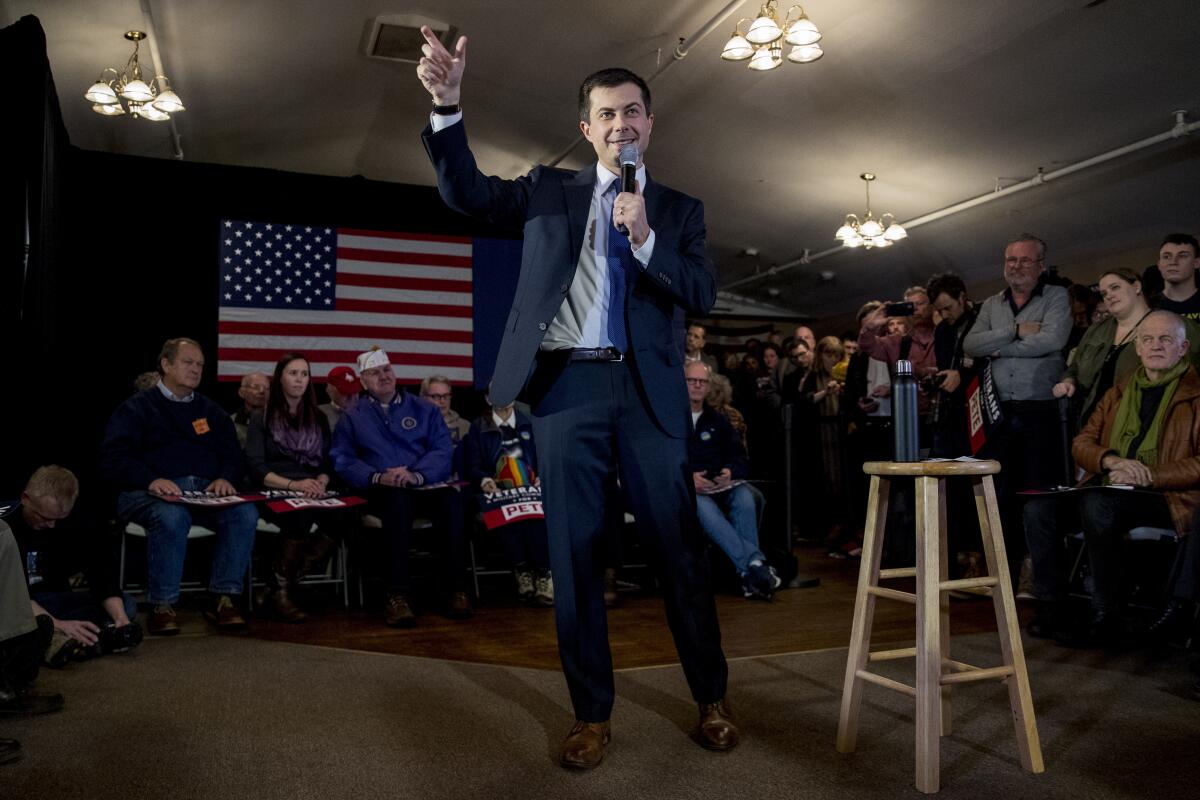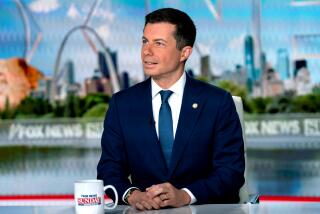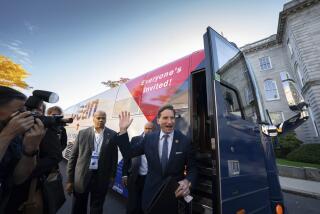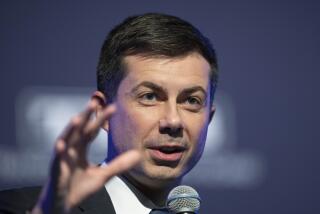Column: Buttigieg wants to be the Goldilocks candidate. It just might work

WASHINGTON — Not long ago, Pete Buttigieg was unknown outside of South Bend, the fourth-largest city in Indiana, a state so red it voted for Democratic presidents only twice since 1940.
But as he heads into the New Hampshire primary on Tuesday, the former mayor of South Bend is a surprisingly good bet to win the race for the Democratic presidential nomination.
He’s gotten this far mostly on raw political talent — without the years of experience, deep bases of support or fundraising networks some of his rivals enjoyed.
Yes, he’s given eloquent speeches and assembled, at 38, a gold-plated resume (Harvard, Rhodes scholar, naval intelligence officer in Afghanistan, management consultant). But he’s risen mostly because of canny political judgment that led him to seize what appears a sweet spot on the Democrats’ political spectrum.
He’s cast himself as the Goldilocks candidate: younger and more progressive than Joe Biden or Amy Klobuchar, but more moderate and less combative than Bernie Sanders or Elizabeth Warren.
“You don’t have to choose between the status quo … and the revolution,” he said recently.
Much of his stump speech is a call for “generational change,” an attempt to turn his youth and earnest Eagle Scout demeanor into an advantage.
First-time listeners often come away impressed — although if you’ve heard him more than once, the pitch can also sound bland and generic.
But Buttigieg’s policies are more interesting than he makes them sound. Most fall midway between Biden’s nostalgic liberalism and Sanders’ calls for a “political revolution.”
His most distinctive position is on healthcare, where he rejects Sanders’ “Medicare for all” proposal, which would eliminate private medical insurance for a government-run system, a step many voters aren’t ready to embrace.
Buttigieg’s alternative, which he calls “Medicare for all who want it,” would still mandate universal health coverage but allow people to choose either government-run insurance or a private plan.
Polls show most Democrats like both ideas. But the Buttigieg version is far more popular among the independents and Republicans who will vote in a general election.
His clarity on healthcare is probably the main reason he has risen so fast, especially compared with Warren, who stumbled on the issue when she initially backed the Sanders proposal and then appeared to back away, angering both sides.
In a similar Goldilocks vein, Buttigieg would raise taxes on the wealthy — not as much as Sanders or Warren, but more than Biden. Unlike Sanders, he doesn’t slam billionaires for their wealth; he raises money from them at high-dollar fundraisers and doesn’t apologize for it, saying Democrats need all the help they can get to beat President Trump.
A study by Americans for Tax Fairness, a liberal group, found that Sanders’ proposals (including Medicare for all) would raise federal spending by about $50 trillion over 10 years. Buttigieg’s would raise spending by about $8 trillion, and Biden’s would raise spending by about $3 trillion.
Buttigieg says he would mandate free tuition at public colleges for most students, but not for children of wealthy parents. Sanders and Warren would make college tuition-free for all.
Buttigieg’s rivals complain — accurately — that his views have shifted. In 2018, as he was preparing to run, he said he favored “Medicare for all.” In early 2019, amid a wave of progressive sentiment, he joined in calls to decriminalize illegal border crossings. He walked back from both positions as his campaign moved toward the center.
His critics say he trimmed his sails in search of votes — and campaign contributions, which he denies. Warren has accused him of running a “consultant-driven campaign with some vague ideas that are designed not to offend anyone.”
Vague or not, Buttigieg appears to have gained a solid foothold in the moderate majority of the Democratic electorate. He’s likely to benefit if Biden continues to flail, as he did in Friday’s debate in Manchester.
Buttigieg effectively tied with Sanders in the chaotic Iowa caucuses last week. But he ran well ahead among voters who call themselves “somewhat liberal,” the party’s largest ideological category.
For all that, he has vulnerabilities, and they will be tested in the months ahead.
He is the first openly gay candidate to run for president, and no one knows if that will prove a liability.
He has been notably weak in polls of African American voters, who are a crucial Democratic base in South Carolina and other Southern states. In Friday night’s debate in New Hampshire, he didn’t offer a convincing explanation for statistics showing disproportionate arrests of black men in South Bend during the eight years he was mayor.
His claim to electability won’t be convincing unless he begins winning by bigger margins than his hair’s-breadth finish in Iowa.
And while he often points out that he has more military and governing experience than Trump did in 2016, if Buttigieg gets the nomination, the president will have a field day mocking the former small-city mayor.
The immediate question is whether either Buttigieg or Sanders, the top two finishers in Iowa, can expand his appeal and take the lead. Can Buttigieg acquire moderate voters who have backed Biden until now? Can Sanders win support from Democrats fearful of his call for a political revolution?
And can either of them beat Michael R. Bloomberg, the billionaire former mayor of New York, who has spent more than $200 million of his own money, and vows to spend much more, in states that will vote on Super Tuesday, March 3, including California?
If Buttigieg, Sanders and Bloomberg lead the field a month from now, Democrats will definitely have a clear choice. And the Goldilocks candidate might just win.
McManus’ column appears on Sunday and Wednesday.
More to Read
Get the L.A. Times Politics newsletter
Deeply reported insights into legislation, politics and policy from Sacramento, Washington and beyond. In your inbox three times per week.
You may occasionally receive promotional content from the Los Angeles Times.











